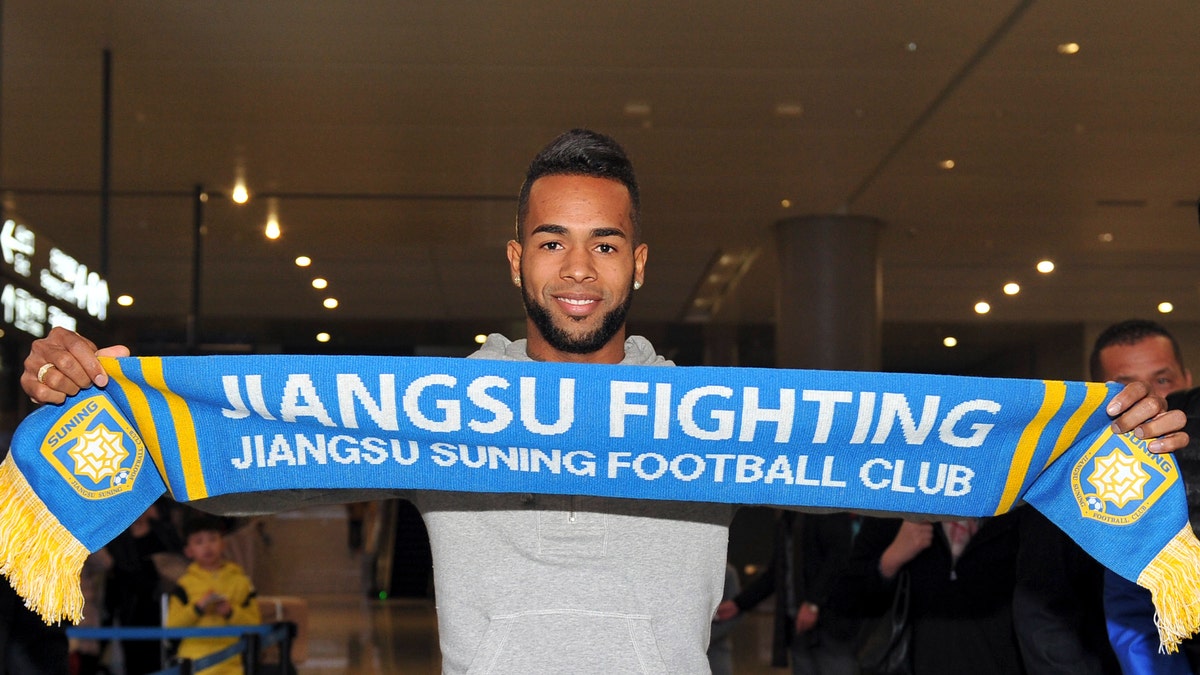
Brazilian striker Alex Teixeira upon his arrival in eastern China's on Feb. 13, 2016. (ap)
This year, China has been dominating soccer news during the European leagues’ transfer window.
Jiangsu Suning FC signed Brazilian midfielder, Alex Teixeira, for a reported $55.7 million, and signed another Brazilian international, Ramires, still only 28, away from Chelsea for a reported $31 million.
Those signings were part of a 10-day spree in which China outspent the rest of the world, shelling out $290.5 million while Premier League clubs spent $254.7 million.
This begs the question, Does money make you a player on global soccer pitch?
This is what sources say is the hope of Chinese President Xi Jinping. In an effort to win a World Cup bid and to also win the tournament, the Chinese President put in place a policy that puts cash to work in order to achieve this goal.
- Best pix of the week
- U.S. women rout Puerto Rico 10-0 in CONCACAF Olympics qualifier
- Brazil court freezes Neymar assets, including yacht and jet
- Brazilian Soccer Fan Shows His Passion While Making Trophy Replicas
- Who Said Women Don’t Like Soccer?
- NYC honors U.S. women’s soccer team after World Cup victory
Simon Chadwick, professor of sports enterprise at Manchester’s Salford University was recently quoted as saying, “It's a brand positioning statement. It's telling the world, 'We're here, and this is what we're doing.'"
The Chinese government is helping supporters and fans of the game by fostering soccer culture and mandating programs in schools.
The recruiting effort and open wallet isn’t limited to players. Chinese clubs are snatching up top coaches (think Luiz Felipe Scolari and Sven-Goran Eriksson, who has been in China since 2013) and investing in top European clubs.
Chinese interests have purchased stakes in Manchester City and Atlético Madrid – not simply for monetary gain but for access to training facilities and insider knowledge as to the inner workings of a super-successful club.
Of course, reports of match-fixing and cultural differences can make transfers difficult.
"Chinese football historically has had a governance problem," Chadwick has said. "While corruption standards are improving, they are still not good enough. So anyone going to play in China has to be mindful that there may still be some problems. For example, payment of fees – be it transfer fee or wages."
Some players have had problems settling into the culture and environment. Didier Drogba and Nicolas Anelka, for two, struggled to adjust to life in China and left after six months. But the mixture of the generous paychecks and the adoring fans can be very enticing.
You don’t have to go far – witness the MLS – to see that simply buying big name players in order to draw fans is not a winning long-term strategy. It does nothing to elevate the game at the grassroots level.
In this aspect, the Chinese are to be commended. They seek to create a culture by fostering soccer at the youth level and also to learn from the top teams how to best manage a team.
One day the country may be a soccer power and go-to source for top players, as Argentina and Brazil are now.
Will this get them a World Cup trophy and the glory that comes with it?
Perhaps, but let’s not forget the top talent that comes from Portugal year after year, decade after decade, and the prestige of being recognized as a soccer power has yet to win that country a World Cup.
Video of the week
From the wires
Forward Obafemi Martins didn't travel to preseason camp with the Seattle Sounders, who are considering an offer to send him to a team in the Chinese Super League.
The 31-year-old has been with the Sounders since 2013 and scored 15 goals in 21 regular-season games last year. The BBC reported Sunday that Martins has joined Shanghai Shenhua.
Sounders general manager Garth Lagerwey said in an audio statement released by the team Sunday: "Obafemi's not here with us in this phase of camp. We've had an approach from a Chinese club for his services. It could take a while to have that resolved."
Seattle is preparing for its 2016 opener against Mexico's America on Feb. 23 in the first leg of the CONCACAF Champions League quarterfinals.
Lagerway says, "Hopefully we know more by the end of the week."
The Associated Press contributed to this report.
